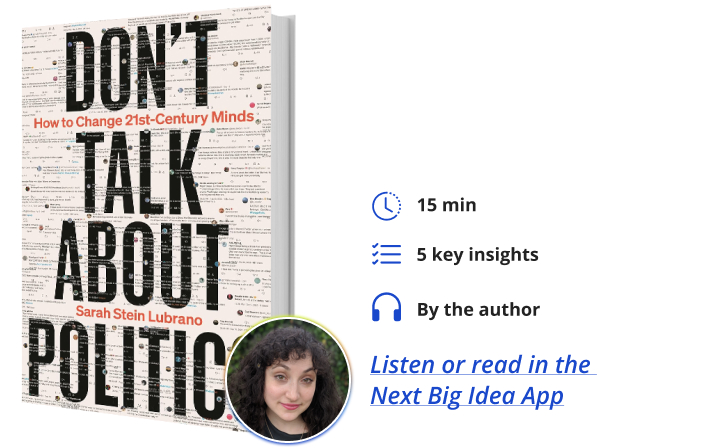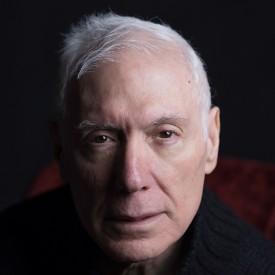Sarah Stein Lubrano is a writer, political theorist, and activist. Her thinking often reaches the public through the Sense and Solidarity Initiative and the Future Narratives Lab. She was previously Head of Content at The School of Life, tutored in prisons, and wrote obituaries. She regularly appears on public radio and a variety of podcasts.
What’s the big idea?
The chances of talking someone into changing their political beliefs are extremely slim. People respond minimally—if at all—to arguments, debates, or even others’ stories. What matters is their own lived experience, as well as the strength of their close relationships and community ties. By giving people opportunities to engage with the world differently and by repairing social wellbeing, we can open people’s minds to believe differently.
Below, Sarah shares five key insights from her new book, Don’t Talk About Politics: How to Change 21st-Century Minds. Listen to the audio version—read by Sarah herself—below, or in the Next Big Idea App.

1. Don’t debate it.
We live in a society obsessed with the idea that if we just expose the truth in the media, debate what’s best on air, write essays about an issue in school, or post about it on social media, then people will eventually come to see the truth, fight back against abuses of power, or gravitate toward the right way of thinking. This is a beautiful idea—but all the best evidence shows arguments do not change minds.
People who watch TV debates don’t vote any differently afterward, and this is true across decades and across continents. Similar data show that people do change their minds about scientific issues, but once an issue appears to be political, people presented with new information don’t shift their views. Even protest demonstrations have no effect on public opinion or government policy.
This is likely because political issues are closely tied to our sense of self. Most of us don’t feel that bad or stupid for having gotten some facts wrong, but we feel deeply threatened and disoriented to think we might have a political issue wrong. This is because we experience the discomfort of cognitive dissonance: a discomfort, however unconscious, when we encounter a contradiction between our beliefs and our actions. To resolve this often-unconscious discomfort, we often hold tighter to our existing beliefs and rationalize away evidence we don’t like.
We can see this empirically in the case of Trump voters. Most believed a felon shouldn’t be president right up until he was convicted, and then a huge percentage changed their belief about felons 180 degrees and suddenly said it was fine for a felon to be president. We all do this from time to time to hold on to the sense that we are, broadly, right in our most fundamental beliefs.
To do politics better, we have to get past the impulse to argue with people. This is hard, but it’s the first big step.
2. Our actions change our minds.
We might think that politics works like this: first, we think in the abstract about what the right idea is, and then we implement that. But psychology shows that our brains often work the other way around: first, we make some changes in our lives, and then our political beliefs change as a result. People tend to shift their political beliefs in line with the reality of their lives, particularly their personal actions.
“We make some changes in our lives, and then our political beliefs change as a result.”
If they’ve experienced the effects of climate change, on average, they’re more likely to believe in it. If they can no longer purchase plastic bottled water in their town, they conclude that plastic is bad and don’t want it to be for sale. It’s even (and surprisingly!) true that women who get turned away for an abortion they want become slightly less in favor of abortion. We seem very often to move our beliefs toward whatever our lived experience was, even if we didn’t choose it ourselves.
This can make people believe either good or bad things. For those of us interested in social change, it means that if we want people to become interested in new ideas, we have to give them gateway actions to try things out—to expand their lived experience. If we want people to become more environmental, we might ask them to help clean up a park; if we want people to become more open to migration, we might ask them to collect clothes for migrants and refugees. This is more effective than presenting arguments or stories. Research shows these small actions get people slowly more interested in the issue, so that over time their beliefs come to align with these gateway actions.
3. We all need to fight social atrophy.
Many of us have had our brains shrink over time. Research shows that when people are socially isolated, they lose grey matter in the front of the brain associated with social skills. As a result, social interactions feel like more work and more stressful. (Ever felt like just cancelling plans?) When people become socially isolated, they tend to become worse at reading social cues and become more suspicious of others. (That person not texting you back? They must hate you.)
Our entire society is going through a period of intense social withdrawal. People have fewer friends than before and see other people face-to-face less frequently. As a result, social trust is at an all-time low. Many of the factors contributing to this are economic—with rises in the cost of living, people have had to move further and further apart, and it’s becoming increasingly difficult to find affordable and convenient ways to access public spaces, meet new people, or even see one’s friends. We end up turning to our increasingly addictive screens instead.
“Our entire society is going through a period of intense social withdrawal.”
On an individual level, it’s good to think about social life as something (like exercise) that we should gently push ourselves to do every day, even if we have a moment of not feeling like it. This preserves brain health, and the strength of interpersonal relationships is the strongest single predictor of happiness and wellbeing. But more than that, our societal health depends on our social connections. When social trust declines and people have fewer close relationships, they become less tolerant of other groups and more prejudiced against minorities. As we become more isolated and individualistic, we come to know less about other people’s lives and thus understand political issues less well.
To be well as individuals and as communities, we need to rebuild the social fabric. We can start fighting against distrust by rebuilding our friendships (offline) and social spaces.
4. Weak ties and regular protest aren’t enough for social movements.
Many social movements of the last few decades have been remarkably ineffective. Demonstration-led protests appear to have had no discernible effect on public opinion. Even Black Lives Matter protests appear to have had no overall effect on opinions about police violence in the United States, especially once the backlash is considered. Moreover, these movements often dissipate quite rapidly (compared to older historical movements, like the Civil Rights Movement, which might have lasted for decades).
For those of us who want to change the world, it’s important to understand why this might be. Many modern social movements are instances of networked protest, where a large number of those who get involved in the protest discover the movement online or through their weak ties (friends of friends, rather than close friends). The fact that we can find out about protests and get involved easily means huge numbers of people can be mobilized rapidly. Indeed, the Black Lives Matter protests had the largest number of participants in American history. But it also means the ties networked protests create are fairly weak.
“The ease of organizing with technology has backfired, leading to lower investment in activist causes over time.”
People are often showing up because of a tweet or two. No close friends will be there to see them at the next event; no huge responsibilities are undertaken. People easily leave the social movements. In short, the ease of organizing with technology has backfired, leading to lower investment in activist causes over time. If you’re organizing a movement, don’t just tweet about it. Ask everyone involved to bring their close friends.
5. To change someone’s mind, change their life.
Long-term relationships and actions change our political views when words don’t. One of the best ways to build on this, if you’re interested in creating social change, is by building structures that engage people in political life indirectly by restructuring their relationships and possibilities for action.
A key example is that of a local food co-op, where people who live within one or two blocks of each other bulk-order food together. Not only do these co-ops help people eat for as little as five pounds or dollars a week, but they also encourage people to become more politically and socially minded. They learn about changes in the cost of living together, how much food supermarkets waste, and the profits these companies are making.
As one organizer put it, “By the time the eviction notices come in, people are organized,” and they show up and defend each other’s homes. This interdependent, action-oriented kind of living is the basic unit of political life.
What matters, and what works, when it comes to political engagement, is the day-to-day building of relationships and trying out new ways of living. It’s far more important than media campaigns, raising awareness, so-called “critical thinking” divorced from action, and especially arguing with one another online or in person.
Enjoy our full library of Book Bites—read by the authors!—in the Next Big Idea App:
































